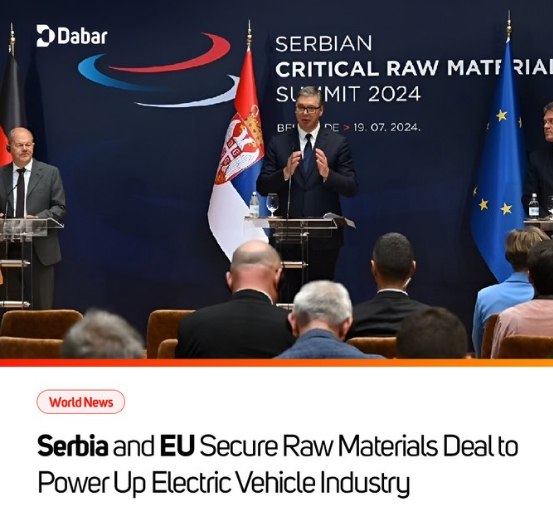It is always about oil or mineral rights.
The European Union and Serbia celebrated a landmark agreement on lithium mining, heralding it as a “historic day for Serbia and Europe.” On Tuesday, Serbia reinstated Rio Tinto’s license to mine lithium in the Jadar Valley, marking the end of an intense race to secure this valuable resource. By Thursday evening, German Chancellor Olaf Scholz was in Belgrade, touting the deal as a critical step towards safeguarding Europe’s economic security.
Serbia and EU forge strategic partnership on lithium and EVs #Serbia #lithium #jadar #mining #EVs https://t.co/EEehDE3Ot6 pic.twitter.com/E09aoHuNAf
— bne IntelliNews (@bneintellinews) July 19, 2024
Scholz underscored the urgency for Germany’s auto industry to secure lithium supplies as it transitions to zero-emission vehicles. With the Jadar project potentially meeting up to 90% of Europe’s current lithium needs, the deal places Europe in a stronger position to reduce reliance on Chinese lithium.
On Friday, European Commission Vice-President Maros Sefcovic joined the celebration in Belgrade at a summit focused on critical raw materials. The event attracted key European companies like Mercedes-Benz and Stellantis, eager to secure a new lithium source for their electric vehicle batteries. The summit culminated in an agreement to establish a strategic partnership for sustainable raw materials, battery production, and electric vehicles.
Sefcovic hailed the day as historic, while Scholz praised the courage of Serbia’s leadership for overturning a 2022 ban on lithium mining, recently deemed unconstitutional. This move is seen as essential for maintaining Europe’s sovereignty and economic independence in a changing world.
Serbia locks lithium deals with the EU amid Jadar’s revival 🇷🇸🔋
Serbia, the European Union and Germany inked on Friday a series of deals granting EU members and some of the continent’s most important carmakers exclusive access to Serbian lithium.. https://t.co/DR27ExyrSi $RIO… pic.twitter.com/AiDZa5otUu— Oliver Groß (@minenergybiz) July 19, 2024
Despite the high-level endorsements, the path to this agreement was fraught with controversy. The 2022 moratorium on lithium mining came after extensive protests across Serbia. Environmentalists and concerned citizens, many of whom were new to activism, feared the environmental impact on the Jadar Valley’s crucial food and water sources. They were also alarmed by the perceived lack of transparency in granting mining rights to a foreign company.
Serbian President Aleksandar Vucic sought to allay these fears at the signing ceremony, promising complete transparency and a personal commitment to environmental protection. “We will never hide anything from our people at any stage of the opening of the mine,” he declared. Vucic also highlighted the economic potential, insisting that the lithium would remain in Serbia, potentially positioning the country as the first in Europe to host a complete lithium-to-electric-vehicle value chain.
However, opposition parties remain skeptical of the government’s assurances. They have long doubted the sincerity of the 2022 mining ban and now demand full transparency regarding the revived Rio Tinto project. Biljana Djordjevic, co-leader of the Green-Left Movement, voiced fears that Serbia could be exploited to supply lithium for electric vehicles that most Serbians cannot afford.
Serbia & the EU sign a landmark agreement to secure critical raw materials, making Serbia a key hub for EV production! Major investments & 20K new jobs expected.
Read more at https://t.co/VibxnCYyoj#EVRevolution #GreenTransition #Serbia #Sustainability pic.twitter.com/ahD1Kvaye5
— The.dabar (@Dabarnetwork) July 20, 2024
The EU and Serbia may be celebrating, but the renewed mining activity is likely to reignite protests in rural Serbia. The concerns over environmental impacts and government transparency have not been fully addressed, suggesting that the conflict over lithium mining is far from over.
Major Points:
- The EU and Serbia celebrated a historic agreement to mine lithium in Serbia’s Jadar Valley, reinstating Rio Tinto’s license.
- German Chancellor Olaf Scholz and EU Vice-President Maros Sefcovic endorsed the deal, highlighting its importance for Europe’s economic security and reducing reliance on Chinese lithium.
- Serbian President Aleksandar Vucic promised transparency and environmental protection amidst public concerns.
- The deal could make Serbia the first European country with a complete lithium-to-electric-vehicle value chain.
- Despite the agreement, public protests are likely to resume due to ongoing environmental and transparency concerns.
TL Holcomb – Reprinted with permission of Whatfinger News



